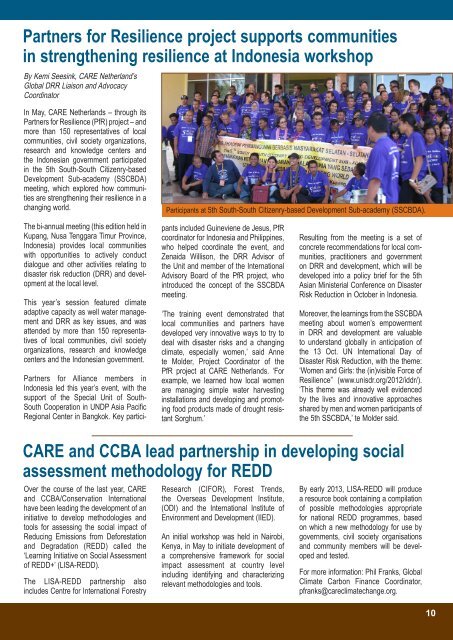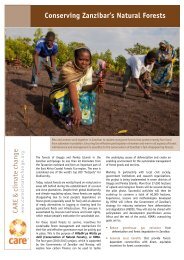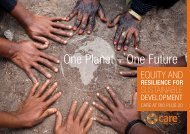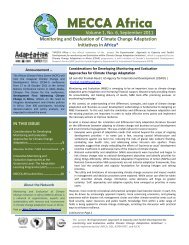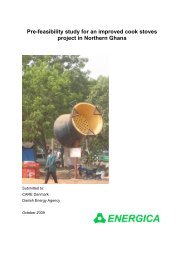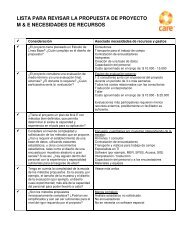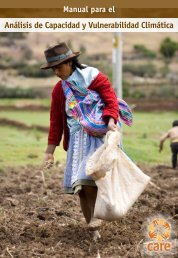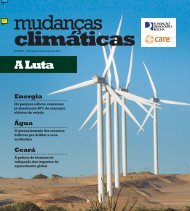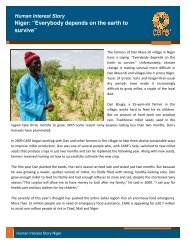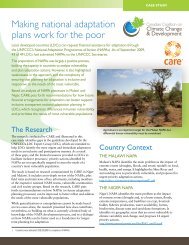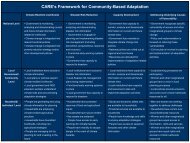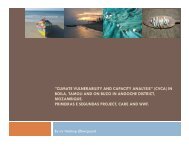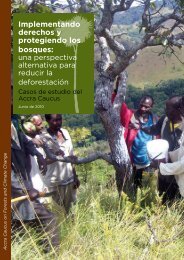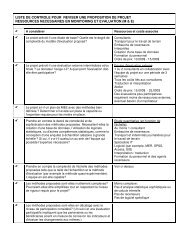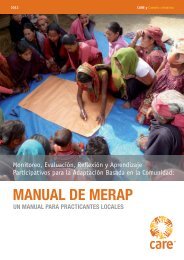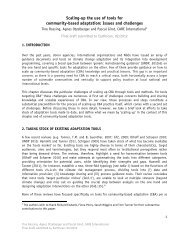PECCN Pages newsletter - CARE Climate Change
PECCN Pages newsletter - CARE Climate Change
PECCN Pages newsletter - CARE Climate Change
You also want an ePaper? Increase the reach of your titles
YUMPU automatically turns print PDFs into web optimized ePapers that Google loves.
Partners for Resilience project supports communities<br />
in strengthening resilience at Indonesia workshop<br />
By Kemi Seesink, <strong>CARE</strong> Netherland’s<br />
Global DRR Liaison and Advocacy<br />
Coordinator<br />
In May, <strong>CARE</strong> Netherlands – through its<br />
Partners for Resilience (PfR) project – and<br />
more than 150 representatives of local<br />
communities, civil society organizations,<br />
research and knowledge centers and<br />
the Indonesian government participated<br />
in the 5th South-South Citizenry-based<br />
Development Sub-academy (SSCBDA)<br />
meeting, which explored how communities<br />
are strengthening their resilience in a<br />
changing world.<br />
Participants at 5th South-South Citizenry-based Development Sub-academy (SSCBDA).<br />
The bi-annual meeting (this edition held in<br />
Kupang, Nusa Tenggara Timur Province,<br />
Indonesia) provides local communities<br />
with opportunities to actively conduct<br />
dialogue and other activities relating to<br />
disaster risk reduction (DRR) and development<br />
at the local level.<br />
This year’s session featured climate<br />
adaptive capacity as well water management<br />
and DRR as key issues, and was<br />
attended by more than 150 representatives<br />
of local communities, civil society<br />
organizations, research and knowledge<br />
centers and the Indonesian government.<br />
Partners for Alliance members in<br />
Indonesia led this year’s event, with the<br />
support of the Special Unit of South-<br />
South Cooperation in UNDP Asia Pacific<br />
Regional Center in Bangkok. Key participants<br />
included Guineviene de Jesus, PfR<br />
coordinator for Indonesia and Philippines,<br />
who helped coordinate the event, and<br />
Zenaida Willison, the DRR Advisor of<br />
the Unit and member of the International<br />
Advisory Board of the PfR project, who<br />
introduced the concept of the SSCBDA<br />
meeting.<br />
‘The training event demonstrated that<br />
local communities and partners have<br />
developed very innovative ways to try to<br />
deal with disaster risks and a changing<br />
climate, especially women,’ said Anne<br />
te Molder, Project Coordinator of the<br />
PfR project at <strong>CARE</strong> Netherlands. ‘For<br />
example, we learned how local women<br />
are managing simple water harvesting<br />
installations and developing and promoting<br />
food products made of drought resistant<br />
Sorghum.’<br />
Resulting from the meeting is a set of<br />
concrete recommendations for local communities,<br />
practitioners and government<br />
on DRR and development, which will be<br />
developed into a policy brief for the 5th<br />
Asian Ministerial Conference on Disaster<br />
Risk Reduction in October in Indonesia.<br />
Moreover, the learnings from the SSCBDA<br />
meeting about women’s empowerment<br />
in DRR and development are valuable<br />
to understand globally in anticipation of<br />
the 13 Oct. UN International Day of<br />
Disaster Risk Reduction, with the theme:<br />
‘Women and Girls: the (in)visible Force of<br />
Resilience” (www.unisdr.org/2012/iddr/).<br />
‘This theme was already well evidenced<br />
by the lives and innovative approaches<br />
shared by men and women participants of<br />
the 5th SSCBDA,’ te Molder said.<br />
<strong>CARE</strong> and CCBA lead partnership in developing social<br />
assessment methodology for REDD<br />
Over the course of the last year, <strong>CARE</strong><br />
and CCBA/Conservation International<br />
have been leading the development of an<br />
initiative to develop methodologies and<br />
tools for assessing the social impact of<br />
Reducing Emissions from Deforestation<br />
and Degradation (REDD) called the<br />
‘Learning Initiative on Social Assessment<br />
of REDD+’ (LISA-REDD).<br />
The LISA-REDD partnership also<br />
includes Centre for International Forestry<br />
Research (CIFOR), Forest Trends,<br />
the Overseas Development Institute,<br />
(ODI) and the International Institute of<br />
Environment and Development (IIED).<br />
An initial workshop was held in Nairobi,<br />
Kenya, in May to initiate development of<br />
a comprehensive framework for social<br />
impact assessment at country level<br />
including identifying and characterizing<br />
relevant methodologies and tools.<br />
By early 2013, LISA-REDD will produce<br />
a resource book containing a compilation<br />
of possible methodologies appropriate<br />
for national REDD programmes, based<br />
on which a new methodology for use by<br />
governments, civil society organisations<br />
and community members will be developed<br />
and tested.<br />
For more information: Phil Franks, Global<br />
<strong>Climate</strong> Carbon Finance Coordinator,<br />
pfranks@careclimatechange.org.<br />
10


